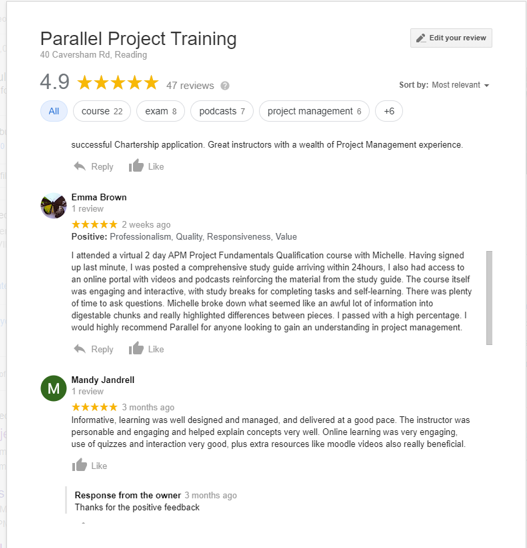It is almost six months since I wrote a blog post on the impact of Covid-19 on my training course. At the time I did not envisage that we would still be delivering all of our programmes virtual six months later. So I thought now would be a good time to reflect on the differences this has made for our customers, trainers and organisation.
Parallel has always had some virtual training delivery as part of our portfolio, although pre-COVID-19 it was limited to overseas clients and a those (generally consultancies) who prefered the improved flexibility, the reduced disruption to the workplace and cost savings associated with virtual delivery. When the COVID-19 lockdown struck everything was transitioned on-line. But how has this transition been for the different stakeholders? Customers, trainers, corporate HR teams and examining bodies.
Virtual Training: The transition from a Customers Point of View
It’s been a very interesting transition from the perspective of course participants. Prior to COVID-19 virtual training was the exception and in general, we encountered several technical issues at the start of a course. Usually, customers would struggle to get microphones and webcams working. I always expected to spend the first 10 -15 minutes of a course sorting out these technical issues. People have, in my view, very quickly adapted to working from home and today most people are highly competent at joining and participating in virtual meeting and web chats. This has made it much easier to get sessions of the gound. The feedback has been great too:

It’s particularly great to see people describe the virtual training courses as interactive and engaging. We get the same feedback in the classroom and it’s good to see this translate to the virtual world. Many people think that on-line virtual training is not as interactive as classroom training but this is not my experience. There is nothing about the on-line world that limits interaction. No-one says that whats-app, slack or snap chat is not interactive. And there is no reason why effective virtual training can’t be as interactive as these social media apps. As with all training, it’s about encouraging participation, sharing ideas and engagement.

We see the same thing with presenter feedback. Almost everyone (93%) of people agree that the trainer makes the virtual training sessions engaging. And the understanding of learning outcomes is just as high:

We have also seen no change in the level of exam results.
Virtual Training: The Transition from a Trainers Point of View
From a trainers point of view, the change has been quite dramatic. Everyone at Parallel has always worked from home. I set up my home office in 1999 when I started working as a professional trainer. However, I was typically on the road 10-15 days a month. Life as a trainer was a constant stream of hotels, train station, airports and meals out. To many, this may seem like a holiday, and I do enjoy the travel but it’s been wonderful to spend more time at home with my family and I don’t miss the Sunday evening journey to a training venue halfway across the country.
What I do miss is meeting the clients in their offices. The lunchtime and coffee break conversation about the real challenges they face. The many impromptu tours of factories or work sites. Over the years these have given me an insight into the real ways many organisations think and work. It’s much harder to build relationships over a video call. I do hope these face-to-face visits will continue soon because I do miss meeting people.
Virtual Training: From a HR Training Point of View
Learning Outcomes
Many HR professionals I talk to have concerns that on-line training will not be as good as traditional classroom training. They feel it lacks the interaction and ability to ask questions. However, my view is that this depends on what you want people to learn. If the course is syllabus based, about learning new knowledge to be tested by a formal exam we have seen that the learning can be just as good. This is born out by the delegates feedback and also exam pass rates. This might not be true for training aimed at behavioural change, developing new practica skills, or simulation and role play.
Logistics
The main change from a HR department view is the shift in focus from a logistics point of view. There is no longer a need to book meeting rooms, receive course materials. However, there are new areas such as IT firewalls, on-line joining instructions and online exam requirements that need to be met.
Savings
Form a HR training programme perspective the advantage of on-line virtual learning is the cost savings on delegates and trainer expenses. Take a typical 5-day course with 12 delegates who are all travelling and staying in a local hotel. These expenses could easily add any extra £800 per head to the cost of the course (5 nights hotel, meals and travel). For a group of 12 people, this would be £9,600 in travel and expenses costs. This is often a hidden cost because individuals may claim it back from their departments budget, but nevertheless it can significantly increase the cost of training courses.
Virtual Training: From Examining Body Point of View
Fo examining bodies the change to on-line delivery has meant two main changes. First, they have a much more direct relationship with people taking the exams. With paper exams, the examining bodies processes and systems were hidden from the end customer. The training provider acted as the interface providing all the logistics etc. With an on-line exam, the customers are interacting directly with the services provided by the exam providers. Therefore they have had to get much better at handling customer questions and queries.